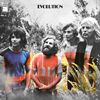 It’s perfect timing for a re-issue of this Oz psych-surf-prog classic. Tamam Shud is back playing the occasional show (one of which, in Sydney on September 9, we have an association with) and a new recording, “Eight Years Of Moonlight”, is in the LP racks.
It’s perfect timing for a re-issue of this Oz psych-surf-prog classic. Tamam Shud is back playing the occasional show (one of which, in Sydney on September 9, we have an association with) and a new recording, “Eight Years Of Moonlight”, is in the LP racks.
“Evolution” came out in 1969 and was a milestone in the history of Australian recording. It’s hard to believe (cue: cultural cringe) but it was the first LP of all-original compositions to be released in this country.
The soundtrack to a Paul Wizig surf movie of the same name and the band played the songs they’d composed while the film was projected onto a studio wall. Where the new record really did take eight years (off-and-on) to record, “Evolution” was put to tape in less than three hours.
Unsurprisingly, “Evolution” doesn’t sound slick or sanitised. Today’s Pro-Tools Generation of sound engineers would take exception to what went onto tape. Lindsay Bjerre’s vocal is buried too deep at times, and some of the instruments are recorded in the red. You can hear the grills on the amplifier cabinets rattling. Good, I say.
There was no such thing as a click track In the late ‘60s in Australia and pitch correction was something a groundsman did after dark on a cricket oval with a hose and a roller before the visiting team had to bat. Bands would mostly stand-and-deliver with a handful of microphones and almost no acoustic studio baffling. Double-tracking vocals was as tricky as it got.
The Prog Rock label can signal “Pretentious Intricate Nonsense Ahead” but sometimes it’s applied to music because there’s a lack of anything else to call it. The revelatory moments on “Evolution” more than make up for any awkward ones. No goblins were summoned up in the making of this record. It’s well-arranged, compelling and deserving of its classic status.
You need to understand that Tamam Shud established a link between high-energy music and Sydney’s surfing tribes that most overtly manifested itself in their worship of Radio Birdman and Midnight Oil barely a decade later. They built a huge following of their own off the back of three-fifths of fuck-all radio airplay, almost entirely through live shows. This record was largely ignored. Edwin Garland's interview with Lindsay Bjerre here tells you more.
You wouldn’t expect a band whose name was supposedly derived from a piece of 11th century Persian poetry to sound like a conventional rock and roll band. Indeed by this stage of their life cycle, Tamam Shud had progressed from conventional surf music and R&B to exploring places that were far less limiting.
Opener “Music Train” manages to make a bold statement from the get-go. Heralded by a steam train “sample” (at least that’s what it would be called today), it rides on alternately chugging, stop-start and driving rhythms. Zac Zytnic’s full-throated guitar roar is prominent throughout and Bjerre’s rich vocal sits at the rear.
“I’m No-One” is an elegiac snippet of psychedelic displacement that could have fallen straight off Love’s “Forever Changes” – it’s that good. “Lady Sunshine” captures the mood of the times perfectly with Bjerre’scat-inflected vocal rubbing up against Zytnik’s lyrical guitar. If Australia came late to the Summer of Love via an influx of US servicemen on R & R, the Shud was one of the leading local bands successfully picking up on that vibe.
There was a slew of Aussie acts playing in the heavy space in the halls and clubs of the cities and suburbs. Tamam Shud and its ilk clung to the coast where the grass was as plentiful but the outlook was sunnier. You’ll hear that on “It’s a Beautiful Day”, a dynamic gambol over the sand-hills down to the water's edge. Fuzztone keeps it rooted in the ground but the delicate and plaintive guitar figures wafting over the top add a sense of lightness.
The false start in the driving, bluesy “Feel Free” underlines that this session must have been fun. “Jesus Guide Me” adds darkness to the light and even recalls Neil Young’s earliest work with the band that would become Crazy Horse.
This is a snapshot of Tamam Shud at a particular time and place; they’d undergo significant change in a short time, with Zytnic leaving to be replaced by 16-year-old prodigy Tim Gaze and many line-up shifts following. They'd record their cosmic, environmentally-themed album, “Goolutionites and the Real People”, and of course parts of another celebrated surf soundtrack, “Morning of The Earth”. It would all sound different to this.
Available as an LP (soon) and download.



 1/2
1/2

